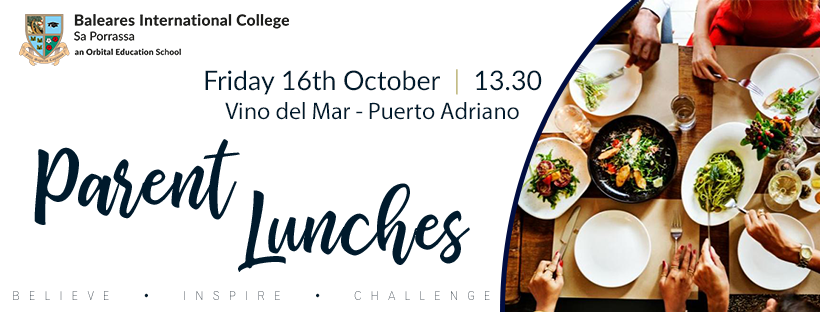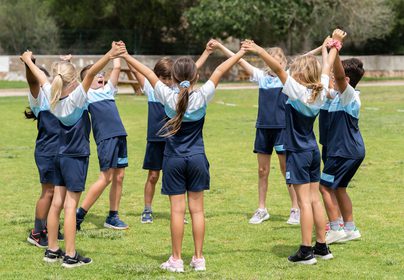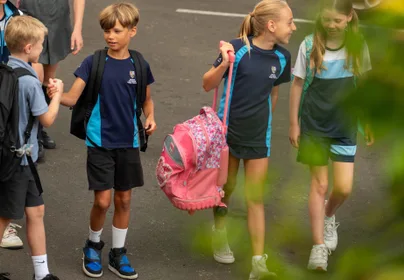A message from Alison Colwell, Principal
Dear Parents,
In this week's newsletter, to mark World Rainbow Day, we are celebrating the extraordinary work of people - and our children and young people are certainly extraordinary. I have been so impressed with our students from day 1 - with their manners and politeness, their attitude to learning, their warmth and friendliness, their incredible talents - academically but also musically, creatively, in the sports arena or on the stage, linguistically (in some cases fluently trilingual!) as well as displaying the important values and attitudes that we hold high and seek to nurture in our young people: kindness, resilience, adaptability, integrity and altruism. A month into the new school year and with all its challenges and regulations, our young people have positively shone in the way they have managed, have got on with their lessons and learning and have risen to all the challenges with such a positive attitude. As we reflect on individuals who have made such a difference in the world, I acknowledge and thank all of our own extraordinary children and young people here at BIC, for being so wonderful.
Kind regards
Alison Colwell
Principal, BIC Sa Porrassa
Mrs Alexandra Tomlinson - Head of Secondary
Be the change you want to see in the world.
The apathy of the young is a perennial theme of the old. Worrying about too much screen time and social media distractions, a drop in political engagement and general self absorption, the media gives youth a hard time. Not only do they have to contend with negative representation of this ilk, so too are they told that it will fall to their generation (Generation Z), to save the world. Against the backdrop of this type of negative publicity and pressure they could be forgiven for living up to those stereotypes, but this could not be further from the truth.
Malala Yousafzai is proof that young people can change the world. Becoming the youngest person in the world to be awarded the Nobel Peace Prize, she is representative of thousands of prolific young people actively seeking and enacting global change. It is easy to think of someone like Malala as being a one off, a distant yet inspirational semi-divine figure who was somehow singled out by fate for her role on the world stage. Easy, also, to allow ourselves to believe that we are not in that category of proactivism. Yet, all who know Malala's story, know that it all began with a blog for BBC Urdu - a simple yet profound step towards an explosion of reform.
There are 1.8 billion people between the ages of 10 and 24 who make up Generation Z and studies all over the world are showing increasing levels of social activism, political engagement, active volunteering and charitable giving in this age group. A recent study by forecasting firm, Sparks and Honey, found that 24% of 16 to 24 year olds volunteer on a regular basis, whilst according to the latest Milennial Impact Report from the Case Foundation, 84% make regular charitable donations and 70% have volunteered at least once for a charity in the last year. All of this proves that this generation is deeply committed to improving the lives of others on our planet.
When I spoke in my beginning of term assemblies, I told the students of BIC that much was expected of them - at both a school and global level. However, I reflected on what skill and personal qualities that would take. An empathy with one´s fellow human beings, compassion and a continuous, unconditional kindness, a powerful commitment to social justice, a nobility of soul and character and the drive and determination to weather all adversity with humour and good will.
I have seen so much already in the last four weeks, that fills me with hope and faith for our future, from the students in our care. They are as inspirational and brave as Malala and I have every confidence that they will play their part in making their world a better place for all.
Mrs Alexandra Tomlinson
Head of Secondary
Science department news - An insight into our Science subjects
A message from Mr Cadman - Head of Science
People often ask me when my love of science began and I struggle to pinpoint an exact moment. However, it is clear why it remains a passion of mine. For as far back as humans have existed, we have been an intelligent species. We have used our large brains to look at something and ask one of life’s most important questions: Why?
This question has been the root cause of all technological progress since the dawn of man. Science isn’t a set of beliefs, nor is it a code of conduct. It’s a method for answering that question, a way for gathering evidence to provide an explanation for ‘Why?’.
Science as we know it revolves on following a process known as “The Scientific Method”. This method begins with that fundamental question of Why? We observe a phenomenon, and put forth a hypothesis to explain the question and set forth to test that hypothesis by doing experiments.
Anyone who follows the scientific method is, in fact, a scientist. You may not have a fancy degree, or years of background knowledge on a topic, but you are a scientist - when you ask why, propose an explanation and determine whether your explanation makes sense. That is science - it may not always be flashy, but many times the crudest of experiments have led to some of our greatest findings!
Here at BIC we try to challenge what we believe and inspire students to question the world around them.
Mr Stuart Cadman
Head of Science
Science with Year 7
Our Year 7 students have been wonderfully enthusiastic as they have thrown themselves into learning about the solar system, our galaxy and the universe.
The students have been taken on a journey through the scolding atmosphere of Venus all the way to the diamond rains on Neptune. As the students gained a deeper knowledge of the solar system, they started to pose more questions. They were keen to investigate the correlation between distance from the sun and temperature, and distance from the sun and year length. Acting as true scientists, they were able to not only identify anomalous results that did not seem to fit the pattern, but they also accounted for these differences. We are always pleased when our students ask more questions to deepen their understanding. We don’t want students that simply accept what they read without casting over a critical eye.
As part of our drive to work together to improve literacy, the students reworked the fairytale “Goldilocks and The Three Bears” - with a twist. While Goldilocks sought out porridge that was the perfect temperature, our students were able to see parallels in the solar system (and in some cases beyond) as they discovered the “Goldilocks Zone.” The Goldilocks Zone refers to the habitable zone around a star where the temperature is just right - not too hot and not too cold - for liquid water to exist on a planet. The students unleashed their imagination as they wrote their own story “Goldilocks and The Three Planets.” Using their knowledge of physical and chemical conditions on the planets of the solar system, the students were able to craft wonderful reimaginings of a traditional tale. Well done to them all, what fantastic imaginations they have!
In other literacy news, some of our Year 7 classes have now moved onto studying nutrition and the digestive system. Once again, they have shown a wild and vivid imagination as they have chronicled the journey of a chicken sandwich through the digestive system. In order to develop a love of reading further, we would highly recommend the “Horrible Science” series of books, one of which has a thrilling journey through our gut! Additionally, Bill Bryson’s “The Body, A Guide for Occupants” is a fantastic read for older students in the key stage.

Science with Year 8
Our students have been learning about food and nutrition this year in science. Having already studied elements of the human body, the focus has been the extension of knowledge and skills towards iGCSE. Students were set the challenge of working as nutritionists to plan an appropriate meal plan for a range of individuals including Donald Trump, Lady Gaga and Thiago Alcântara. As professionals, the students were asked to be mindful of bias, whilst also setting aside any feelings that they might have had about individual people, as they worked as nutritionists in both a caring, non judgemental and ethical manner. With a thorough knowledge of food groups and their nutritional impact on the human body, together with an understanding of the specific lifestyles of the clients, they were able to meet their needs. Using Body Mass Index and blood pressure data, the students worked hard to support their patients.
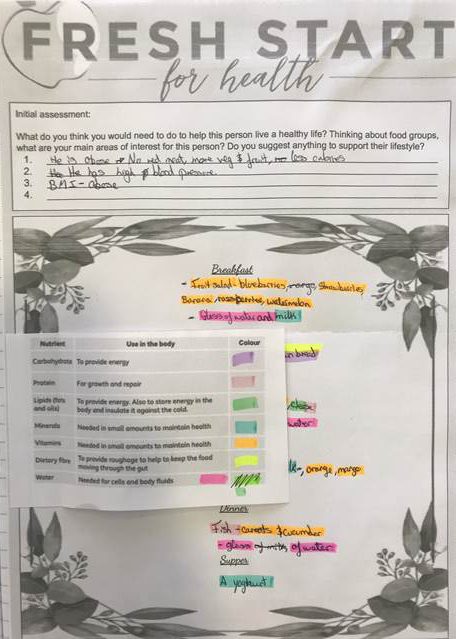
Moving beyond balanced diets, the students were then set the challenge of investigating key nutrient deficiencies across a range of global contexts. Acting as advisors to the Director General of the World Health Organisation, the students have been able to review problems such as anemia in Cambodia and the resurgence of scurvy in economically more developed countries. We look forward to reading their finished reviews.
Lastly, some students at the start of the year were able to extend their learning about cells from Years 6 and 7. Here is an excellent example of work from one of our students who produced a New Scientist themed article about stem cells, really getting under the skin of clinical, social and ethical concerns surrounding the topic. Well done!

Science with Year 9
Our Year 9 students have recently been deepening their knowledge of sound and light. We are blessed to live on an island with such a wonderful climate for outdoor learning. All teachers of year 9 have had their classes out in the school grounds in order to allow the students to calculate the speed of sound. The students showed a great deal of maturity as they were tasked with making accurate sound recordings of symbol clashes at various places on campus. The students not only calculated the speed of sound, but they also started to investigate the impact of reaction time on the validity of the data that they collected.
Whilst we benefit from a wonderful climate for most of the time, we have no shortage of electrical storms on the island. As students gained mastery of applying the formula for calculating speed, they were able to calculate how far a lightning strike is away from us during a storm by counting the time elapsed between the lightning and us hearing the sound. Next time a storm rolls in (similar to the recent storm captured in Palma Nova), do ask your children to estimate how far away the lightning strike was.

In terms of light, the students were introduced to the father of modern optics, Ḥasan Ibn al-Haytham. Ibn al-Haytham was a scientist from the Middle East who invented the camera obscura. His work was almost lost until it was translated and published many years ago in Toledo. The students followed in his footsteps as they learnt about the camera and in some cases built one. In the attached image, you can see how light enters a pinhole in a camera in straight lines, forming an inverted image on the screen. As we said to the students, the main difference between this primitive camera and a modern film operated camera is simply that, the photographic film. Well done to the students who produced some excellent examples!
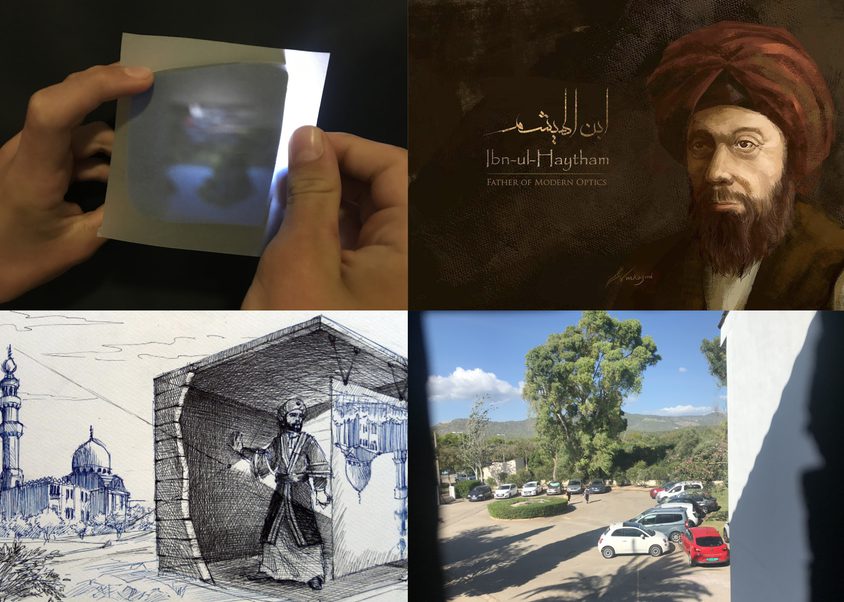
In comparing and contrasting the properties of sound and light, the students were amazed at the speed of light, travelling at 300,000,000 metres per second! The students learnt that when we look at the stars beyond our solar system, we are looking into the past. They were particularly interested in the fact that the light from Betelgeuse (the red giant of the Orion constellation) arrives in our eyes after making a journey of 650 light years from the source. Betelgeuse has been behaving very oddly over the last few years, leading us to believe that it could go supernova at any moment. The star may have already gone supernova in this moment, though we do not know yet as the light takes so long to travel to us. When it does arrive, some scientists believe we will have another sun in our sky. The students saw parallels between this and the sunset in Tatooine from the Star Wars films.

Science with Year 9 and Year 10
In preparation for Year 10, Year 9 have been learning all about light and sound waves. Some of the topics covered have been reflection, refraction and dispersion. Students have been outside measuring the speed of sound, and they have also been learning all about the electromagnetic spectrum.
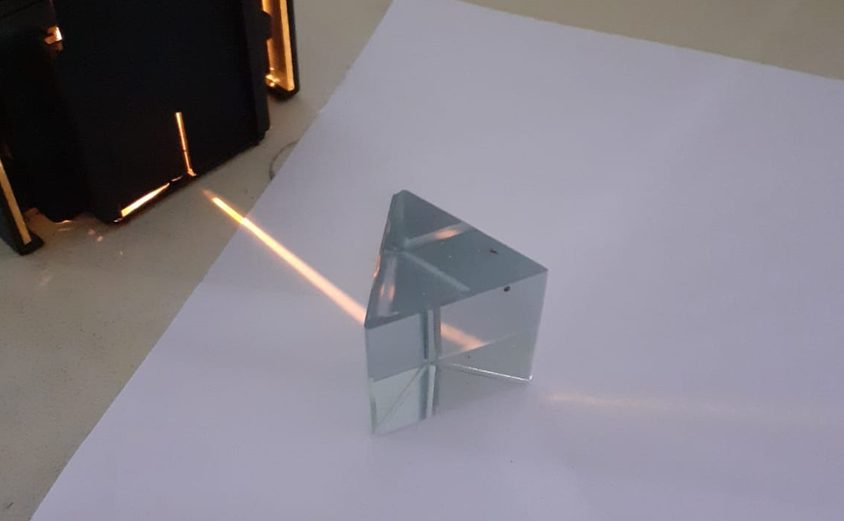
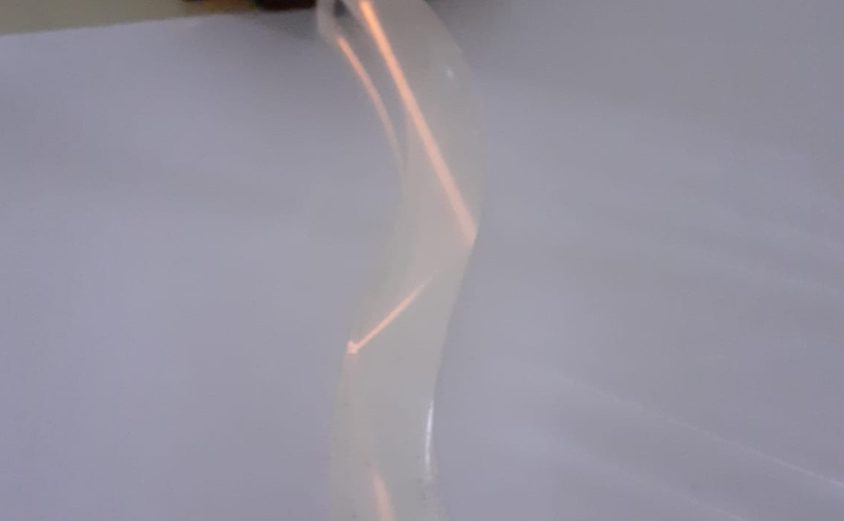

Science with Year 10
This week Year 10 has been studying plant nutrition. This has allowed a number of opportunities to get outdoors in the lovely green surroundings of BIC and study some of this in action. Part of the course looks at mineral deficiencies in plants and the students have identified that the health of some of our plants might need a bit more attention. Although experiments have been halted with the current situation, we have been fortunate to take advantage of the outdoors for some of our lessons.
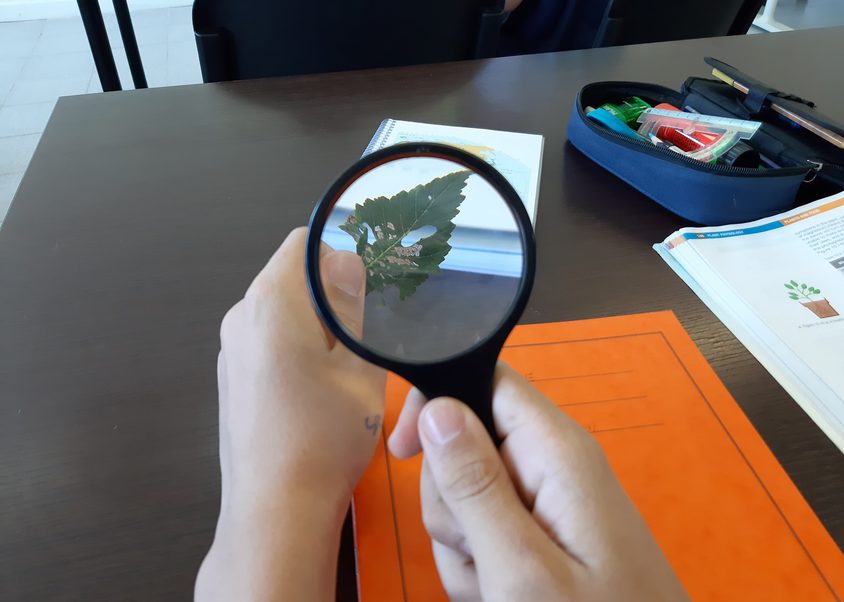
Although experiments have been halted with the current situation, we have been fortunate to take advantage of the outdoors for some of our lessons.

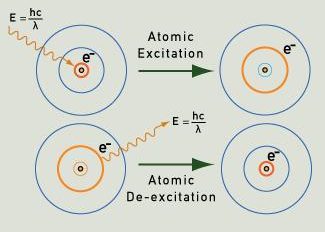
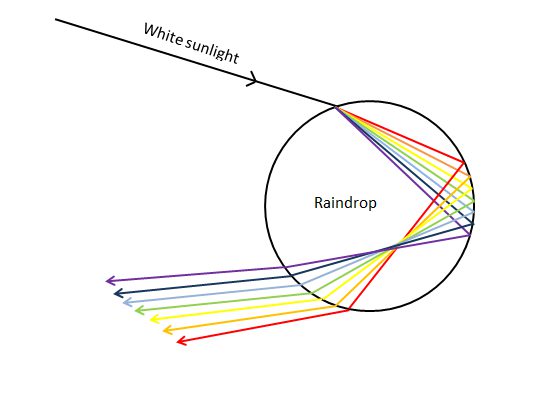
Physics at BIC Sa Porrassa
This week in physics students have been studying the nature of light itself! Year 11 have had the particle nature of light revealed to them through looking at electron excitation and photon emission. Year 10 has been investigating how rainbows form through refraction and what gives objects colour and how we perceive it. This will culminate in a discussion of their findings on World Rainbow Day!
Year 12 biologists have been learning about mammalian transport systems. This has included topics such as the heart, the cardiac cycle and the blood clotting process. It can be tricky to get your head around all the processes and terminology but they have done a superb job.
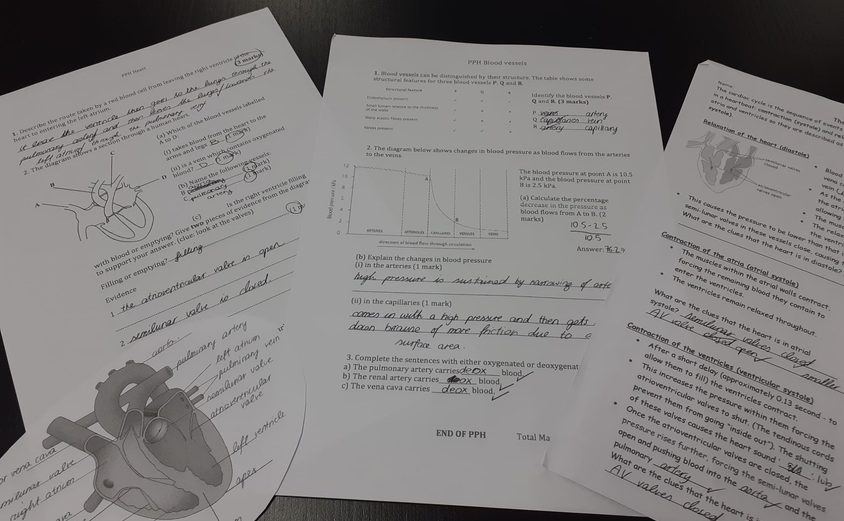
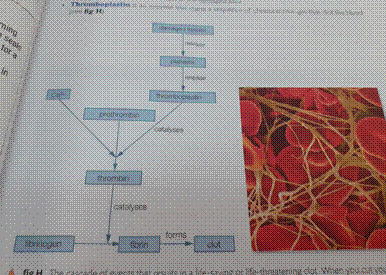
Year 13 biologists have impressed as always, getting their heads around the very complex processes involved during our immune responses. Students have been learning about the specific immune response and the role of the different types of B and T lymphocytes in destroying pathogens.

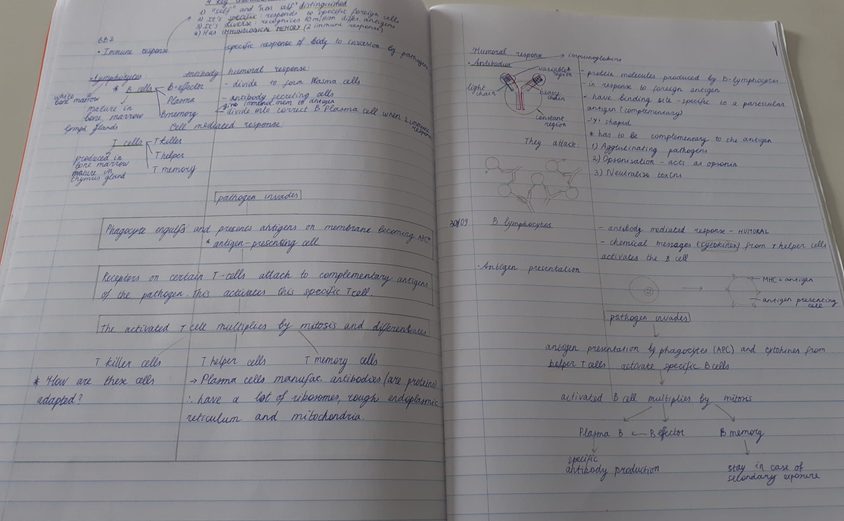
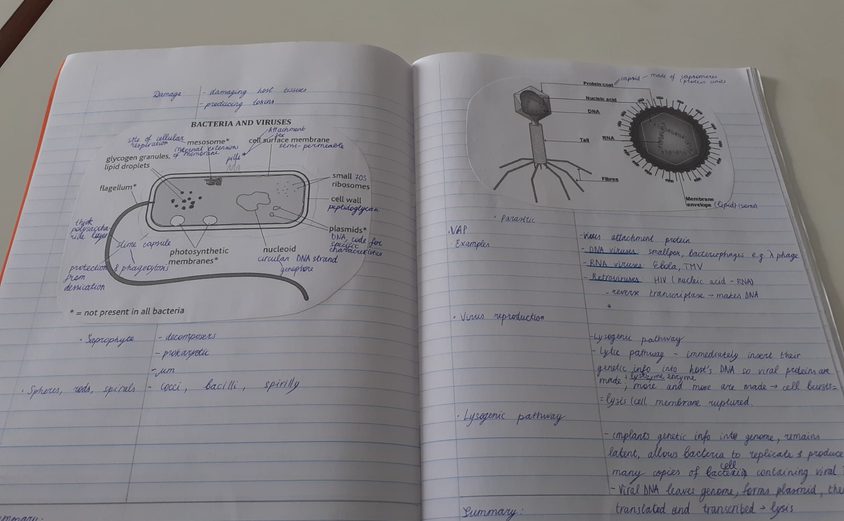
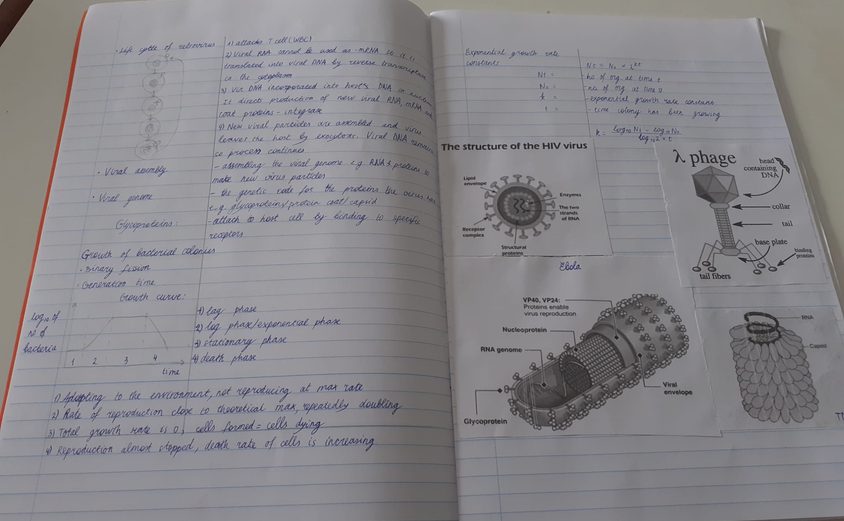
World Rainbow Day Celebration in Science
The science department has been getting into the spirit of Rainbow Day by carrying out some cool experiments based around light and colour. Year 9 have been studying light and have been using prisms to split up white light into all the colours of the rainbow (spectrum).
Year 8 did a recap of acids and alkalis to coincide with Rainbow Day and managed to produce some excellent real life pH scales and rainbows by neutralising alkali with acid and seeing how the colours changed with universal indicator.

Students in Year 10 biology used chromatography to separate out the different colours in ink to make a rainbow. They then used a similar process to separate out the different pigments in a leaf which are used to absorb light for photosynthesis. The pigments include chlorophyll a, chlorophyll b, carotenoids and xanthophyll.

Whole School House System news
Our new House system has been at the heart of so many great things this academic year already, and we are thrilled to see what a positive impact it is happening on our students. As a team, we reflected at the start of the year on what values we believe our Houses should have, and common values shared between us included resilience, determination and positivity, just to name a few. The House system becoming a prominent part of our school will encourage our pupils to build on these values as well as being part of a team, striving for excellence which will be rewarded through our House point system and being able to actively be involved in several aspects of school life. We have loved seeing students wearing their House badges with pride, and we are noticing a sense of team spirit really being adopted by staff, students and families.
We were thrilled with our first House competition which took place last week - the scenic photo of Mallorca challenge! It certainly kept us busy and entertained as students, staff and families sent in their best photos of Mallorca. We had over 100 entries, and we narrowed them down just 4 finalists - one entry per House. It was the over to the public, as the photos were shared on the school Facebook page where people could vote for their favourite by liking, commenting on and sharing their favourite photo. The 4 of us were certainly feeling in the competitive spirit and could not wait to see which House would claim the title for the first competition this year!
The 4 winning finalist entries were -
- Roosevelt House - Laia Gallego (Year 8)
- Parks House - Ben Yamamoto (Year 5)
- Winton House - Jannik Dziejak (Year 11)
- Galileo House - Cameron Cull (Year 7)
Ultimately, after only 3 days and the 4 photos between them attracting over 500 likes and 150 comments (thank you so much to everyone who voted!) the winner was…..
Cameron Cull for Galileo House!!!
Massive congratulations to Cameron. He will be rewarded with 10 House points. Our other finalists all received 2 House points each and every entry received 1 House point. Next week we will reveal the tally to see which House currently is leading the House point competition!
Finally, we are looking ahead to nominations for House captains and vice captains. Each Year group from Years 3 - 11 will have a captain and vice captain for each House. Key stage 1 students will take it in turns to represent their House, and 6th form will have 1 captain per House. This is a fantastic opportunity for all our students - as a House captain is a position of great responsibility and will help students to develop into a responsible and emotionally intelligent young adult. Starting week commencing 12 October, students will learn in tutor time about writing speeches and how our vote will work. More information will follow next week, and we are incredibly excited to see who our future captains will be!
Your House leaders,
Ms Turley, Ms Xidakis, Ms Florey and Ms Mayes.

Languages department news
Congratulations to Julia Gallego for her wonderful award - 7th edition of the school literary contest "letter to a Spanish soldier".
This year our student Julia Gallego was announced finalist in the 7th edition of the school literary contest "letter to a Spanish soldier.
The theme of this contest was the importance of scientific research in the Armed Forces aimed to the development of numerous advances, both future and past, from which we all benefit. The participants had to write a letter to an anonymous military man highlighting the relevant role of said investigation.
The awards ceremony was held on September 29th on the occasion of the "Day of the Defense Delegation in the Balearic Islands" at the Institute of Military Culture and History where Julia received her award.
The Ministry of Defense and the Sub-Directorate General for Recruitment and Labor Orientation also awarded Baleares International College in recognition of its contribution and participation in said literary contest.
We congratulate Julia Gallego for this well-deserved achievement!
Este año la alumna Julia Gallego fue declarada finalista de la 7ª edición del concurso literario escolar “carta a un militar español”. El tema de dicho concurso fue la importancia de la investigación científica en las Fuerzas Armadas para el desarrollo de numerosos avances, tanto futuros como pasados, de los que nos beneficiamos todos. Los participantes tuvieron que escribir una carta a un militar anónimo destacando de alguna manera el papel relevante de dicha investigación.
El acto de entrega de premios se celebró el día 29 de septiembre con motivo del “Día de la Delegación de Defensa en Illes Balears” en el Instituto de Historia Cultura Militar donde Julia recibió unos obsequios y un diploma.
El ministerio de Defensa y la Subdirección General de Reclutamiento y Orientación Laboral también otorgaron al centro Baleares International College un diploma en reconocimiento a su contribución para la difusión y participación en dicho concurso literario.
Le damos la enhorabuena a Julia Gallego por este logro tan merecido
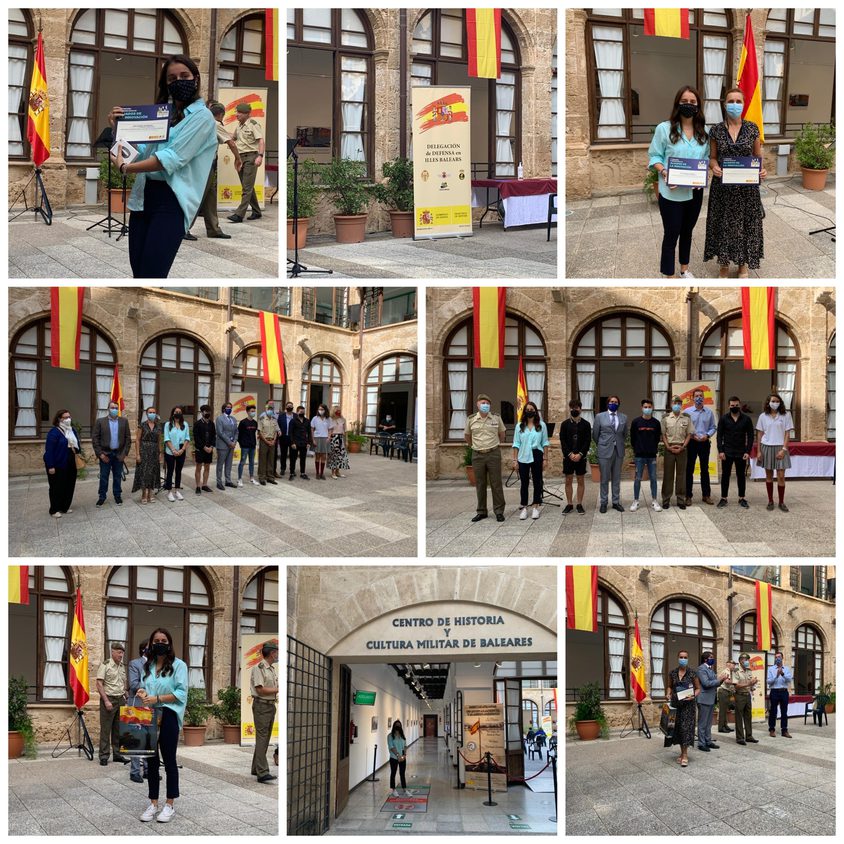
Well done to Manu, Theo, Aleksander and Pau for their insightful Opinion Essay about “Electric mobility or our health”.
We are delighted to share some of the fantastic work from our Catalan students in Year 10 and Year 11.
Manu, Theo, Aleksander and Pau have written an insightful opinion essay about “Electric mobility or our health”. This piece has been entirely written by our students under supervision of our language specialist teacher.
Out students have followed a rigorous process to complete this essay following a total of five steps:
1- Theoretical framework: definition, characteristics and examples of opinion genres (argumentative textual typology).
2- Brainstorming for the choice of news and topics.
3- Discussion and debate about pros and cons as well as appropriateness of each topic.
4- Thesis proposal, arguments and counterarguments shared with their class.
5- Drafting phase and joint review of the thesis.
6- Title proposal through voting and election by the majority.
This project has been a significant learning curve for our students. Therefore, we were very excited to have been able to share this article with a wider audience through the largest newspaper in the island, Ultima Hora, and been able to make this essay more visible, a fantastic reward for our students.
This reward is a great example of how to show our students the practical nature of what is taught in class and what they learn at school. Knowing that your article is the result of a process that is not only about learning but also sharing an opinion and ideas – even influencing who reads them!

Performing arts department news
Performing arts have made a great start this year.
Drama students at key stage 4 and 5 have been creating monologues and investigating different and experimental styles of drama for how they can create monologue driven pieces of drama. Ideas have ranged from time travel, to exploring government control, from mental health stigma to people not always being who they seem. Students are really enjoying being back in the classroom together sharing creative ideas!
GCSE music students are investigating the band Queen and specifically studying the set work of Killer Queen, with several spirited discussions about the piece of music. We are also starting some composition work, creating a piece of music for a theme park, and they are creating some great ideas. At key stage 3 creative arts is being enjoyed by all students, and the students currently in performance for creative arts are producing great work for their projects. We have adapted a project based learning approach, and their projects (ranging from a new musical ´The New Planet´, music and performance for media, and Aladdin the musical) cover not just music but drama, behind the scenes, design and technical theatre, and students are also developing their subject vocabulary and reviewing skills. We are enjoying our new approach, and are very impressed with what our students are producing!´
It’s so much fun. I enjoy every lesson with Miss Mayes. I have learned a lot of new vocabulary, and learned to take my time with my creative work!Year 8 student Gisele
I am learning new things every lessonYear 8 student Julia
I have learned there is a lot more behind the scenes in performing arts and I enjoy being creative - it’s fun.Year 8 student Reya
We have learned a lot about music in adverts and it is different to what I thought! I find our lessons fun and I really enjoy the work.Year 8 student AnayaNOTICE BOARD
Hot monthly School menu available from Monday 5th October
Dear Families
We are pleased to inform you that as from Monday 5th October Saned will be offering hot meals to our students once again.
Please find attached the details about how to order the school meals as well as our October school menu. As you will see in this attachment you will be able to pre-order all meals on the website: www.bicsaned.com.
Please click here to download the October Menu
Please click here to see the instructions on how to order in advance
Canvas - Whole school online learning platform.
If you are experiencing any technical issues please contact it.support@balearesint.net

Attendance
Outstanding attendance is a core expectation at BIC. There is a proven link between excellent attendance and improved examination grades. Every student should strive for 100% attendance in the school year. The rewards system in school is set up to recognise and reward students who achieve over 97% attendance across the entire school year.
We have an expectation that all students will have at least 97% attendance (no more than 5 days of absence) across the entire school year. Holidays within term time will not be approved. Medical appointments should be made outside of the school day. Parents are required to inform school of a known absence a minimum of 7 days before which will need to be approved by the Principal.
Sickness absence
Parents are required to inform school of a sickness absence at the latest by 8am, if their son/daughter is absent from school via the absence email (absence@balearesint.net).
Attendance below the school expectation of 97% may lead to students not being entered for external examinations.
House Badges
At the beginning of the new school year, each student was given a House badge, an integral part of the school uniform. Replacements for broken or lost House badges can be bought by making a 2 euro payment per badge to the school account.
PARENT TEACHER MEETINGS
Dear families,
In the upcoming month of October we will be hosting our Primary, Secondary and Sixth Form Parent Teacher Meetings. These meetings are aimed to discuss your child's/children's progress and to answer any questions that you might have. All the meetings will be held online and during the afternoon hours. We will soon send further instructions on how you will be able to schedule your slot with the teachers and connect with them virtually.
- Thursday 8th October - Parent Teacher meetings for Year 11, Year 12 and Year 13
- Thursday 15th October - Parent Teacher meetings for Year 7 and Year 10
- Wednesday 21st October - Primary Parent Teacher meetings
- Wednesday 22nd October - Primary Parent Teacher meetings
- Wednesday 22nd October - Parent Teacher meetings for Year 8 and Year 9
Please do not hesitate to get in contact with us in case you might have any questions
Warm regards
BIC PTA Parent Lunch- 16th October
Dear Parents,
The BIC PTA Community is pleased to inform you that we will be holding our first Parent Lunch of this academic year at Vino del Mar in Port Adriano next Friday 16th October at 1:30pm.
The restaurant will be offering a three-course meal, water and one glass of wine for 18€ per person.
Please see the Menu below:
Starters
- Goats cheese, tuna and sun dried tomato salad
- Vitello tonnato
- Italian Bruschetta
Main Meal
- Chicken, mushroom and leak risotto
- Salmon and prawn tagliatella with dill cream
- Burger with mushrooms and mayonnaise
Dessert
- Tiramisu
- Chocolate brownie
(If you will require a vegetarian option please do let us know and we will inform the restaurant)
If you would like to join us, please confirm your place(s) as soon as possible as there is a maximum capacity of 10 people per table. Please confirm your attendance by Wednesday 14th October.
We look forward to seeing many of you there and meeting lots of new BIC parents.
Kind regards,
BIC PTA Community
